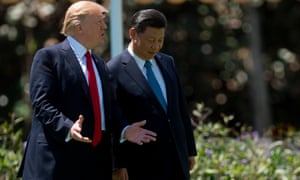Financial markets are starting to have doubts about Donald Trump. The euphoria that sent share prices on Wall Street to record levels has quickly dissipated amid fears that the new president is dangerously unpredictable.
Evidence that Trump doesn’t really have a clue what he is doing is mounting by the day. The failure to get Congress to agree to a repeal of Obamacare was the first sign of trouble, since it raised questions about whether the White House would be able to pass an economic stimulus package.
But there has been more to unsettle investors since then – much more. First there was the U-turn over Syria, then the sabre-rattling over North Korea. Now Trump has decided – in flat contradiction of what he said on the campaign trail – that China is not gaining an unfair trade advantage through the manipulation of its currency.
The kindest interpretation of this latest flip-flop is that Trump wants to keep Beijing sweet while the US launches military action against North Korea, although this prospect is not exactly designed to make investors any less nervous. A more accurate assessment of Trump’s first three months in the job is that he is making it up as he goes along.
Not only did Trump backtrack on China’s alleged currency manipulation in an interview with the Wall Street Journal, he hinted that Janet Yellen might after all get a second term in charge of the Federal Reserve and said he thought the dollar was getting too strong.
On this last point, at least, there was some sense in what the president had to say. It is all very well sabre-rattling about the imposition of tariffs and putting taxes on imports but a rising currency would blunt the impact of any protectionist measures by making US exports dearer. That’s assuming, of course, that there will be any protectionist measures. On current form, there probably won’t be.

Trump appears to think that the strength of the dollar is a vote of confidence in him. If only. The greenback is strong because the Fed is the one major central bank in the world that is raising borrowing costs, and investors have been assuming that the US central bank will accelerate the pace of interest rate increases in response to a Trump-inspired pick up in growth. That scenario is starting to look less likely.
The response in the currency markets to Trump’s latest comments was predictable. Traders took their signal from the White House and dumped the dollar. More significantly, perhaps, demand for gold and the Japanese yen – traditional safe havens in times of uncertainty – rose to their highest level since the US presidential election last November.
Share prices remain close to their record highs but for how long? Cannier investors have taken one look at Trump’s Dr Strangelove-style foreign policy antics and decided to park their money elsewhere. US defence stocks look like a decent bet; the rest of the stock market does not. Caveat emptor.
